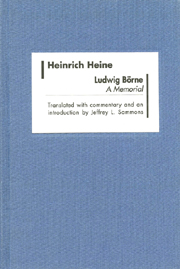Book V
Published online by Cambridge University Press: 05 February 2013
Summary
The political conditions of that time (1799) have a quite troubling similarity with the most recent conditions in Germany; only that then the sense of freedom flourished more among scholars, writers, and other such littérateurs, but today expresses itself much less among these, but much more in the great active mass, among artisans and tradespeople. While at the time of the first Revolution the leaden German sleeping sickness weighed on the people, and a brutal calm, so to speak, prevailed in all Germania, the wildest ferment and ebullience manifested itself in our world of letters. The loneliest author living in the most remote corner of Germany took part in this movement; almost by a natural sympathy, without being exactly informed of the political events, he felt their social significance and expressed it in his writings. This phenomenon reminds me of the big seashells that we sometimes put on our mantelpieces for decoration and, though they be ever so distant from the sea, nevertheless suddenly begin to resound as soon as it is flood tide and the waves break against the coast. When the Revolution flooded forth here in Paris, the great human ocean, when here it surged and stormed, there, on the other side of the Rhine, German hearts resounded and roared. But they were so isolated, they stood among nothing but insensate porcelain, teacups and coffee pots and Chinese pagodas that mechanically nodded their heads as though they knew what it was all about.
- Type
- Chapter
- Information
- Ludwig BörneA Memorial, pp. 105 - 124Publisher: Boydell & BrewerPrint publication year: 2006

